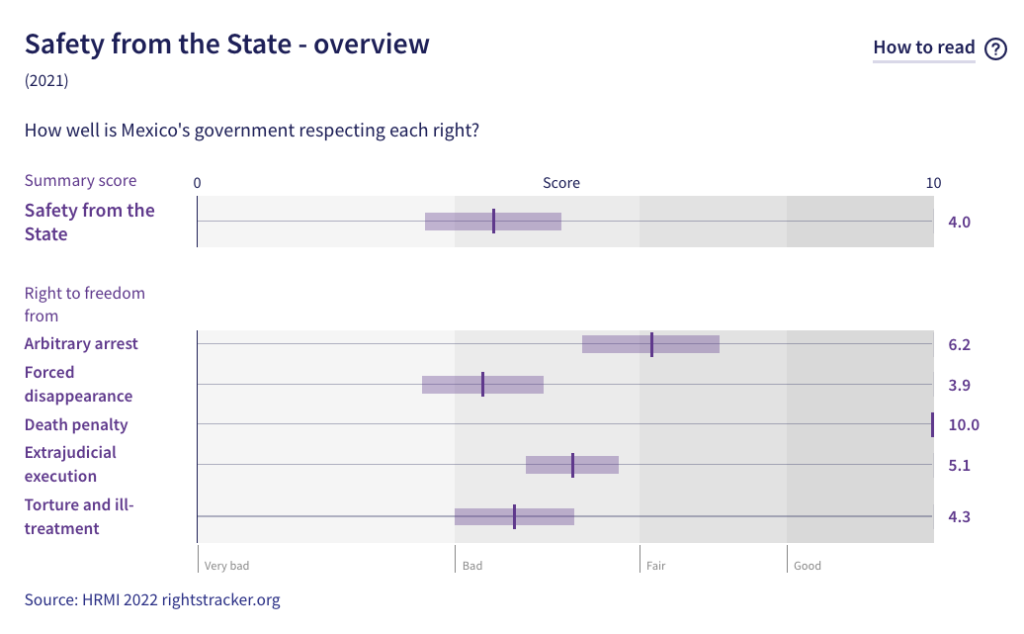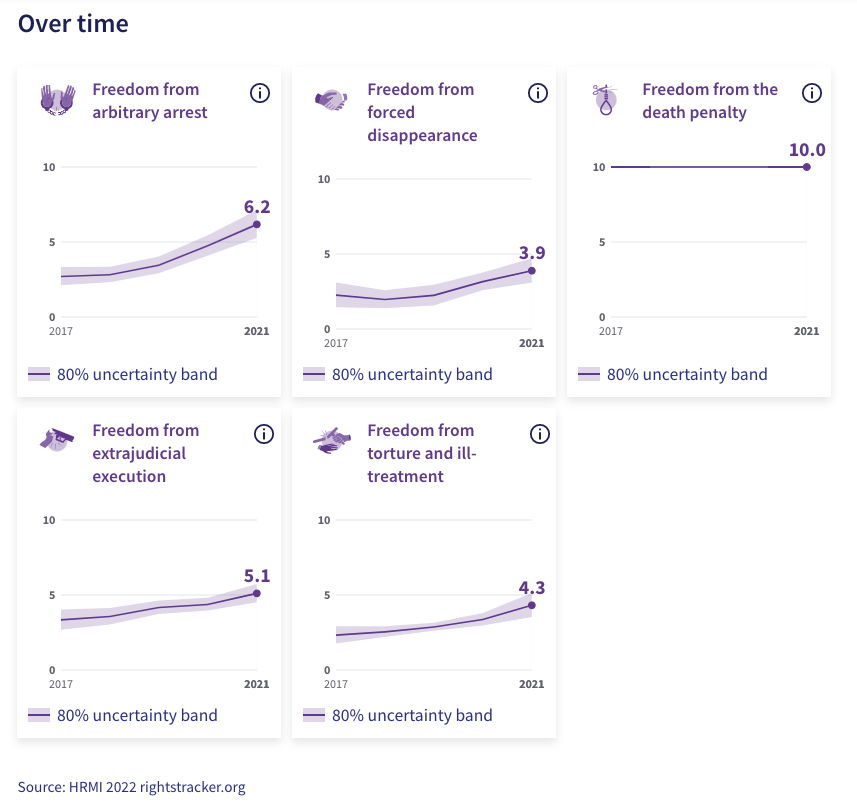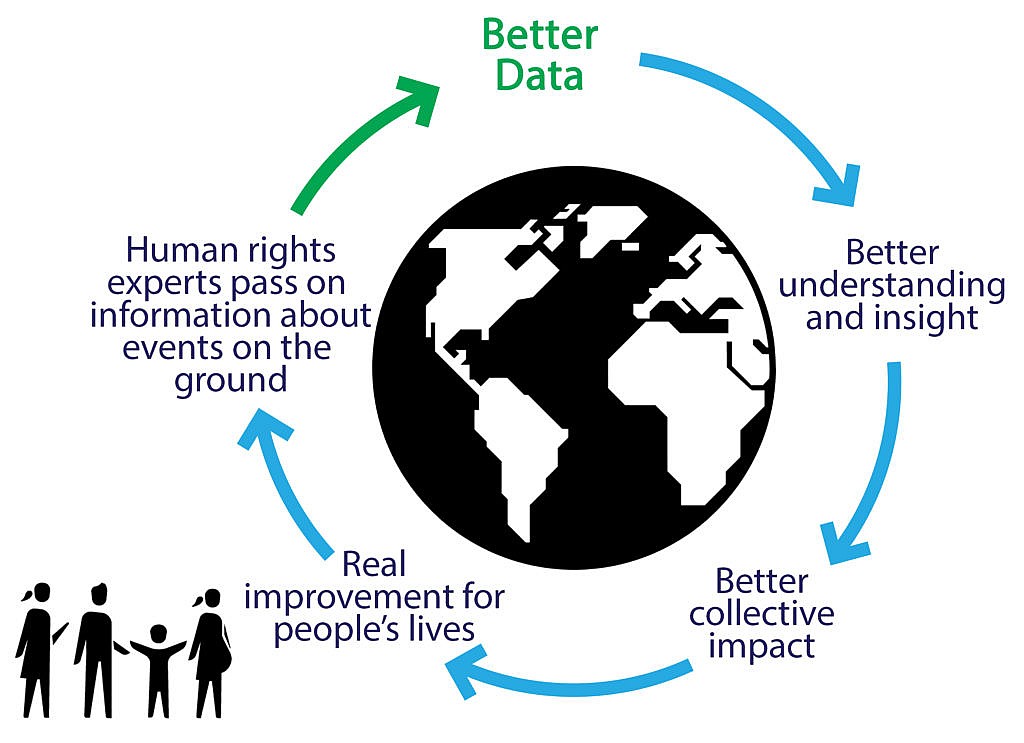Engaging the private sector in improving human rights
This article was a conversation starter, and part of our consultation in 2022. It is now slightly out of date, with HRMI’s new sister company, Rights Intelligence, having launched in 2023, but still provides some useful questions and answers about why we have embarked on this step.
Contents of this article:
How will Rights Tracker: Investor improve people’s lives?
Where will the license fees go?
What are the benefits to non-private sector users?
Does HRMI really need more funding?
How do private sector users get access to Rights Tracker: Investor?
Engaging the private sector in improving human rights
The Human Rights Measurement Initiative (HRMI) is building the foundations for a human rights revolution. We believe that what gets measured gets improved, so we are measuring how well governments treat their people, and producing useful country-level human rights data to help governments prioritise human rights.
HRMI is not an advocacy organisation itself. We produce data tools, and make them available to all sorts of people, such as media, civil society, and governments. In this article, we want to open a conversation on how HRMI can encourage another group – the private sector – to use our world-leading human rights data to bring about positive change through investment decisions.
Our aim is to provide hard numbers to measure all human rights for all countries, and we’ve made a strong start, with five economic and social rights scores available for nearly every country in the world, and eight civil and political rights scores for a smaller group of countries. All these measurements are freely available on the Rights Tracker.
Two problems and a solution
Here’s the first problem: we need to grow faster. If we are to sustainably reach our next significant data milestone – full global coverage of our civil and political rights measurement – we will need to quadruple our annual income within the coming five years. To produce country scores like the ones for Mexico you can see in the screenshot below, we go directly to local experts in each country, asking them to share their knowledge of the state of human rights there. This takes dedicated resources to safely contact thousands of human rights defenders in up to 200 countries, in dozens of languages, and requires more infrastructure than we currently have funding for.

We’re excited about the transformation we can help unlock when we’ve reached this goal! Accurate measurement can shine a light on where improvements are needed, and where changes are making a positive impact.
Already we have documented improvements in economic and social rights scores in India; improvements in Mexico’s civil and political rights scores, as you can see below; sharp drops in respect for human rights in Hong Kong as the Chinese government exerts more influence there; we’ve shown that the election of Jair Bolsonaro was associated with significant falls in freedom of opinion and expression scores in Brazil; and we’ve been able to show the ups and downs as governments responded to the Covid-19 pandemic in different ways. Imagine what data we’ll be able to provide the world when we expand to such varied countries as Russia, Israel, Finland, Nigeria, Pakistan, Canada, and Indonesia – just some of those on our wish-list to add next.

And here’s the second problem: there’s one very powerful group that may not currently be using our data to the extent we know they could be: the private sector. Through our research, and a series of meetings and a Summit over 2021-2022, we have learned that there is enormous potential to provide solid human rights data to institutional investors, ESG country score providers, and companies, so they can make wise decisions on where to direct capital flows and where to source inputs for their supply chains. The OECD guidelines for Multinational Enterprises and United Nations Guiding Principles on Business and Human Rights outline the human rights responsibilities of the private sector, but there is a long way to go to in this area, and a real need for better data to support progress.
Our data will help the investors and companies themselves to manage risk (both financial and reputational) as they figure out which countries to invest in, and it will also help them to make more positive impact on the lives of everyday people. There is enormous potential here for significant impact.
For example, right now many low-income countries are missing out on investment because their low GDP per capita makes it hard for them to score well on a whole range of indicators. Our economic and social rights data address this problem by measuring how effectively countries convert whatever income they have into good outcomes for their people. So a country with few resources, but good governance, can get a high score on the Rights Tracker. We are excited to think that these countries could attract more investment if the private sector were taking these facts and measurements into consideration.
These crucial data are ready, right now, for the private sector to use, but we have identified a couple of barriers: first, while the Rights Tracker gives much more detail on some countries than most private sector users need, we still have a long way to go to get full country coverage for civil and political rights. Second, while we produce at least some scores for nearly every country in the world for economic and social rights, missing indicator data means we don’t have an aggregate Quality of Life score for all countries. These data gaps limit the usefulness of the Rights Tracker for investors and fund managers.
To summarise, that’s two intertwined problems: we need more funding to fill the gaps in our datasets, and the private sector needs our data, but can’t use them until the Rights Tracker is more complete.
Now for the solution we’re proposing, that will help solve both problems: Rights Tracker: Investor. We have figured out a way to produce a special, slim-line version of the Rights Tracker that’s tailored to the needs of the private sector. It is much simpler – for example, there is only one assessment standard for the Quality of Life scores – and more complete, because we have developed a new methodology that takes other sources into account to fill the gaps until we have the resources to roll out our expert survey methodology in every country. Crucially, we will license this new data product to private sector users, while keeping the main Rights Tracker free for everyone to access.
In this way, we’ll be inviting the private sector to support our expansion, to the benefit of everyone who needs robust country-level human rights data.
Asking profit-making organisations to license a specialist data product allows them to help support HRMI and everyone involved in producing the data – including many of our contributors who are currently unpaid.
How will Rights Tracker: Investor improve people’s lives?
Money talks. We want the people who decide where to invest large amounts of money to be better informed about the countries they’re investing in. Right now, investment analysts don’t have top quality information about the human rights situation in different countries – if they use any at all, it is often partial or biased. We want to give these decision-makers better tools, so they can make better decisions.
This will help those businesses – because the evidence is clear that better human rights outcomes lead to better economic outcomes – and it will also help ordinary people as their governments have more financial incentive to treat people better.
Just like with choosing to buy fair-trade chocolate or coffee – and sending a message with our household spending – if investment is going towards countries with good human rights records, that provides an extra incentive for all countries to do better. We want to see governments prioritising human rights – and an extra motivation from the investment community will be really influential.
Where will the license fees go?
HRMI will remain a non-profit charitable organisation. We will set up a new entity to run the Rights Tracker: Investor work, but a significant proportion of the license fees it generates will go straight back into HRMI’s core work – making us less reliant on grants and donations, which currently make up 100% of our income. This will mean we can keep producing data for the Rights Tracker for years to come.
As part of our core work, we will then also be able to invest more in supporting local human rights defenders around the world, and work more closely with them to co-design responses to their advocacy and monitoring needs.
Is this a paywall?
No. The main Rights Tracker, with detailed country scores for the whole world, will continue to be free for anyone to use. The only change we’re proposing to make to the Rights Tracker is to change the Creative Commons License so that anyone using the data for profit needs to purchase a license.
We’re going to produce a separate data series for private sector users. There won’t be any changes at all for other users of the Rights Tracker – except that HRMI will be able to expand, and become more sustainable, and able to keep producing the free data each year.
Only those using Rights Tracker: Investor for business purposes will be asked to pay a license fee.
What are the benefits to non-private sector users?
We have been in partnership with civil society, the media, policy-makers and other users for six years now, and we are so grateful for all the ways we’ve been able to help each other. HRMI works on a reciprocal model, where we gather data from the human rights community on the ground, process it to produce robust measurements, and then offer it back to the human rights community, and others, for free. Human rights defenders and others can then use the data to press for the changes they know need to happen. Together we’re building a powerful tool for their work.

That’s all going to stay the same.
As we attract investment for this new private sector product, we hope that will mean we can invest even more in local human rights communities, such as by providing more training and engagement, paying our Ambassadors who are currently volunteers, and more.
What do you think? What benefits do you see? What would you like HRMI to spend more resources on?
Does HRMI really need more funding?
Unfortunately, yes. HRMI is quite tricky to fund, because we don’t fit neatly into existing categories. Philanthropic funders might be focused on, say, water, or women’s rights. We produce data on both of those – but we’re not solely a water or women’s rights organisation, so we may not seem to them an obvious fit.
For the six years we have been operating, most of our team members have not been paid, or have worked many more hours than they are paid for. We’re passionate about doing this world-changing work, but we can’t keep going without more funding. We urgently need to build a more sustainable funding base so that we can keep making useful data tools for the human rights community – for the whole world.
If investors use HRMI data to stop investing in countries with poor human rights records, could that hurt people?
We’re aware this is a risk. We think it is a small risk, but we are keen to hear from you about your view on this.
The first thing to note is that right now, low income countries are generally missing out on investment in a way we are hoping to help fix. The World Bank has documented a bias against low income countries when it comes to ESG country scores, and this is something that HRMI data would help with – because we take a country’s income into account when assessing how well they’re meeting their economic and social rights obligations.
So when it comes to our economic and social rights scores, the effect of investors using our data will be to bring more investment to low and middle income countries, rather than divert their investments elsewhere.
It is possible that private sector investors might look at HRMI’s scores, particularly on civil and political rights, and decide to favour countries with high scores – with higher levels of respect for human rights. In fact, that’s what we hope will happen – that the influence of private sector investors will provide an extra incentive to all governments to prioritise people’s wellbeing, and work to get better and better HRMI scores.
The downside of this, some might say, is if we consider an ordinary person living in a country where the government doesn’t respect human rights. If investors leave this country, based partly on HRMI data, the economy may suffer, and so might ordinary people.
This is a similar concern that some people have raised about fair-trade products like chocolate and coffee. If I have a choice between fair-trade chocolate and conventional chocolate (which is often made with cocoa grown by people, including children, working in very poor labour conditions), which should I choose? If I support the fair-trade brand, more money goes to the farmers and to producers who prioritise the wellbeing of their workers. But the people who work for the abusive companies might be even worse off if their market collapses – so what’s the right thing to do?
Most labour rights activists, and people trying to stop child labour and modern slavery, argue that by buying the fair-trade chocolate, we are growing the market for cocoa grown in good conditions. Bad employers are more likely to become good employers if there is a market for more expensive chocolate grown in better work environments.
Similarly, making investment decisions using HRMI human rights data can help to lift rights conditions for all people, as promoting human rights becomes a more attractive thing for all governments. A country that is losing investors because of its human rights record faces a clear choice – improve, and attract investment, or carry on violating people’s rights, and lose investment – and our data can help provide an extra incentive for governments to put people first.
What do you think? What risks and benefits do you see if we encourage the private sector to use human rights measurement data?
How do private sector users get access to the Rights Tracker: Investor dataset?
Rights Tracker: Investor is under development at the time of writing. We are still consulting with a wide range of stakeholders and advisors, and developing a beta dataset.
Update (2024): the Rights Tracker: Investor dataset has now been rebranded as the Rights Intelligence dataset. For access please contact Anne-Marie Brook at anne-marie [at] rightsintelligence.com.
Tell us what you think
We want to hear your views on these proposals. Please contact us through this encrypted contact form that goes to a secure email address. Thank you, in advance, for any wisdom you can share with us.


